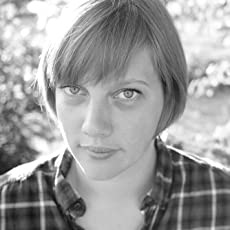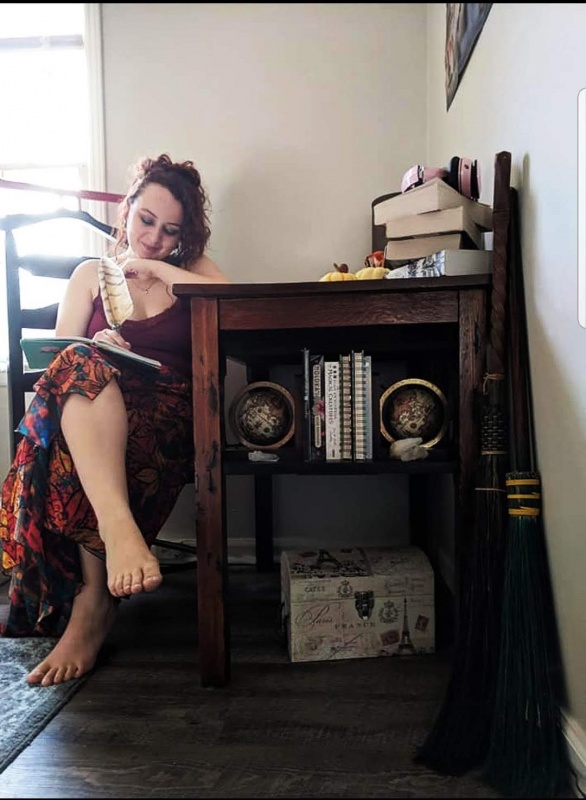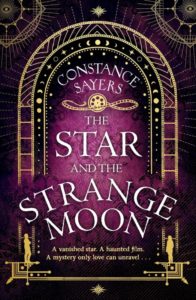NK Chats To… Kasi Blake
 Hi Kasi, thank you for joining me today. Can you tell me about your novel, The Business Engagement and what inspired it?
Hi Kasi, thank you for joining me today. Can you tell me about your novel, The Business Engagement and what inspired it?
I started off writing for Harlequin years ago. Then I moved on to YA Urban Fantasy/Paranormal books. I love writing YA, but it was nice to write about adults for a change. The Business Engagement is Contemporary Romance, a story of two lawyers that can’t stand each other. When the story begins, they are both experiencing huge problems at work. Skylar decides a fake engagement would solve everything. I have always loved Marriage of Convenience stories. That’s what inspired me to do this book.
What’s your typical writing day like?
Well, sometimes I get up before dawn to start writing. But when I get up late, I catch up on emails first. I do some marketing and whatever else that needs doing. I usually don’t really start to write until evening, and then I am usually up until midnight working on a book.
What are the challenges you found when writing your novel?
It’s always difficult to get to know the characters well enough that you know how they’ll react in any given situation. There are just so many moving parts when it comes to writing and endless challenges.
Which fictional character would you like to meet and why?
From this book, it would be Grandma Dot. She’s a pistol. From any of my books, it would be Nick Gallos/Tyler Beck from Bait: Van Helsing Academy because he is a gorgeous rock star with a bigger than life persona. He tours the world killing vampires.
From idea to finished book, what’s your writing process like?
After I get the idea, I make a list of possible scenes. I have to check to make sure all the romance elements are there. Then I dive in. When the book is finished, I put it aside for a while and work on something else. After I’ve forgotten how the story goes, I read it as a reader would, but I pay special attention to what’s wrong. I rewrite. Then I send it out to my wonderful beta readers. They let me know all the problems they spy out, and I rewrite again. Eventually, it gets looked at by an editor. The book goes through several rounds of revisions and editing before it’s ready to go.
Which authors do you admire?
S.E. Hinton got me started writing back when I was in the 7th grade. Her books inspired me. I also love to read Cassandra Clare, JK Rowling, Stephen King, Sarah Rees Brennan, and Nora Roberts.
What’s your favourite word and why?
A Moment With… Angela Jackson
 Best-selling author Angela Jackson, who has just launched her new book, The Darlings, reveals her top five tips on writing:
Best-selling author Angela Jackson, who has just launched her new book, The Darlings, reveals her top five tips on writing:
- YOU DEFINITELY DON’T NEED TO WRITE WHAT YOU KNOW
You have an imagination, so use it! My second novel, The Darlings, is written mainly from the point of view of a thirty-something male comedian. I’m not in my thirties, I’m not a man, and I’d be stretching it to claim to be a comedian, but I did my research. One of our jobs as writers is to head down research rabbit holes to find out why people have affairs, sail around the world, change their religion, leave their partners, change careers, kill people. If you find yourself losing track of time as you research your subject area, it’s a good sign you’ll enjoy writing about the subject. If I’d have stuck to writing solely what I know about, I’d have submitted 70,000 words on the merits of a good cup of tea.
- BE YOURSELF
I once spent a whole academic year silencing my voice. After a buoyant start to an MSc in Creative Writing, once I was ‘put in my place’ by a particular tutor a couple of times, I sat in classes cowed and uncharacteristically silent. Even though I won a prestigious writing award during the same year, I didn’t trust myself to write another good sentence. I started to believe the ridiculous idea that commercial fiction, which is what I write, wasn’t good enough. If you find yourself thinking along these lines: STOP! You don’t need to be a ‘heavyweight’. You don’t need to produce a classic. I look at material I wrote during that wretched year, and it feels utterly forced and lifeless. That’s because I was trying to be someone else. I was trying to be a ‘serious’ writer. It didn’t work. You don’t need to write what you know, but you DO need to allow your own writing voice to emerge.
Novel Kicks Fiction Friday: Christmas in July
 It’s Friday which means it’s time to start writing some fiction.
It’s Friday which means it’s time to start writing some fiction.
Fiction Friday is our weekly writing prompt.
The aim is to write for a minimum of five minutes and then keep going for as long as you can.
Once you’ve finished, don’t edit, just post in the comments box below if you’d like.
Today’s prompt: Christmas in July.
Your character doesn’t like holidays and celebrations at all.
They particularly don’t like all this Christmas in July nonsense.
So, what happens if they fall and suddenly find themselves in a world where it is always Christmas?
First line ‘Gold, red and green lights, what is this?’
NK Chats To… David Russell
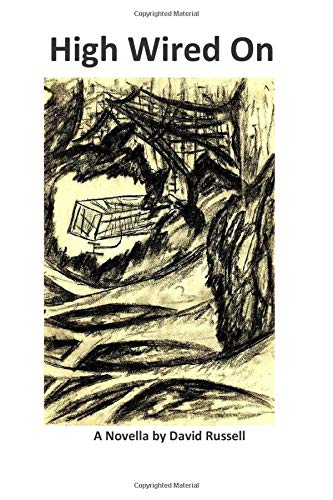 Can you tell me about your novella, High Wired On and what inspired it?
Can you tell me about your novella, High Wired On and what inspired it?
I was inspired to write my dystopian novella High Wired On by a state of extreme despair and negativity. I was inspired to try romance by some powerful efforts on the part of a friend of mine.
What’s your typical writing day like?
For many years I did not have a typical writing day. There were brief snatches of evening time, after a multiplicity of daytime work. That changed with the onset of Covid: with this I generally get up at 6 am and have a solid stretch until about 9.30 am. There are parallel slots in the afternoon and evening.
How long does it typically take you to write a book?
Anything from weeks to years.
What are the challenges you found when writing?
To convey suspense and tension while trying to maintain stylistic accuracy.
Which fictional character would you like to meet and why?
I’d like to meet Selene, the Greek Moon Goddess – the supreme Dream Girl.
What elements make up a good story?
NK Chats To… Michelle Angelle
 Hi Michelle and Angelle. Thank you so much for joining me today.
Hi Michelle and Angelle. Thank you so much for joining me today.
Thank you for having us. We are fans.
Can you tell me a bit about your book, Wrong Guy, Right Room and what inspired the story?
Twenty years ago, we started a book club and fell in love with the romance novels our group read. Inspired, and wanting to work together, we immediately started dreaming up characters.
Unlike traditional rom-coms on the market, we wanted side characters that had agency and strong voices. Together, we imagined scenarios involving two lost loves forced together in impossible situations. We all have a “WHAT IF” person from our past and it was fun to fantasize about a reunion.
Once we started writing this book, the characters presented themselves. Wrong Guy, Right Room is a stand-alone contemporary romantic comedy about second chances and reconnecting with your soulmate.
What’s your typical writing day like and do you have any pre writing rituals like needing coffee and silence?
First, we begin with an ancient chant, and then do an incense ritual to clear our space. Totally JOKING! Between juggling kids, husbands, and part-time jobs, the writing time happens when it can. Luckily, we have one another on speed dial and chat often about crazy ideas. There is rarely a hello, just diving into work the moment we answer the phone. Since we write together, we share docs and emails constantly. While there is no specific ritual, there might be a little mind reading.
What are the challenges of co-writing a novel and what’s the most valuable thing you’ve learnt about the process since starting?
Honestly, the biggest challenge is the writing software. Our first novel was eaten by Google Docs. Trust us, it was an AMAZING book. Otherwise, we both feel super lucky to have a balanced and creative partnership. We have different skills sets and they match up perfectly.
What songs would be on a playlist for this novel?
Book Extract: Deadly Whispers in Lower Dimblebrook by Julie Butterfield
 I’d like to give a lovely welcome to Julie Butterfield and the blog tour for her latest novel, Deadly Whispers in Lower Dimblebrook.
I’d like to give a lovely welcome to Julie Butterfield and the blog tour for her latest novel, Deadly Whispers in Lower Dimblebrook.
When Isabelle Darby moves to the delightfully cosy village of Lower Dimblebrook, she’s searching for peace and quiet as well as a chance to escape from heartbreak. After making friends with Fiona Lambourne, another newcomer to the village, Issie is left reeling when tragedy strikes and Fiona is murdered, the second wife Anthony Lambourne has lost in unfortunate circumstances.
And if that wasn’t bad enough, the local gossips insist that Fiona had been embroiled in an affair before her death, something which Issie knows not to be the case.
Determined to clear her friend’s reputation and solve the mystery of the rumours, Issie takes on both the gossips and the handsome but stern DI Wainwright, making both friends and enemies along the way!
Julie has shared an extract with us today so grab that tea/coffee, comfortable chair and enjoy.
***** beginning of extract*****
Introduction
Living in a village on the edge of the Cotswolds, it was easy to imagine life in Lower Dimblebrook and the characters are all the sort of people I would like to meet myself – with the exclusion of the murderer of course! As a lifelong fan of Miss Marple and Poirot, I could imagine the keystones of the village being the vicar and those residents who were have lived in the same houses for generations and know every nook and cranny of their village. I decided to dispense with the vicar in Deadly Whispers but I definitely needed a vicar’s wife, one of those kind-hearted, totally dependable women who provide a rock of support for anyone who asks.
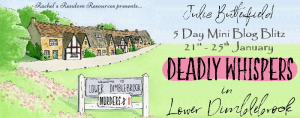 For a moment Issie thought she had found the house empty until she detected a snuffling noise approaching ever closer and the door flew open, two over-excited dachshunds tumbling out to sniff her feet and ankles with all the focus of bloodhounds. A pink-cheeked face appeared a few seconds behind them and Miriam Hollier wiped her hands on her flour-covered apron and tilted her head enquiringly in Issie’s direction.
For a moment Issie thought she had found the house empty until she detected a snuffling noise approaching ever closer and the door flew open, two over-excited dachshunds tumbling out to sniff her feet and ankles with all the focus of bloodhounds. A pink-cheeked face appeared a few seconds behind them and Miriam Hollier wiped her hands on her flour-covered apron and tilted her head enquiringly in Issie’s direction.
‘Hello, Isabelle isn’t it? Do come in. Flounder … Scuttle come along now,’ and Issie found herself herded in the direction of a warm kitchen, rich with the scent of baking and with scones and cakes covering every surface.
NK Chats To… Owen Knight
 Hello Owen, thank you for joining me today. Your book is called Another Life. Can you tell me about it and what inspired the story?
Hello Owen, thank you for joining me today. Your book is called Another Life. Can you tell me about it and what inspired the story?
I had an idea for a character who, despite trying to do the best for everyone he encounters, feels his life to be one of disappointment and failure. Eventually, we discover that his decisions and actions have had a profound, beneficial effect on the lives of others. You could say it’s a modern-day interpretation of the film ‘It’s A Wonderful Life’.
I am also intrigued by quests and the twilight world of things that may or may not be. I am a great admirer of David Lynch and his ability to suggest that things are not as they seem was influential.
As for the story, it’s set in a secretive, hidden corner of Middle England, combining folklore, legends and ancient beliefs with the contemporary issue of what it means to be human in an increasingly technological world.
Thirty years ago, Oliver Merryweather is intrigued by a woman who waves to him from the window of a house in a village he discovers by accident.
In the present day, Oliver believes his life to be a series of failures and regrets. When the same woman appears to him in a dream, Oliver embarks on an obsessive quest to find her. With the village inexplicably absent from all maps, all he has to go on is the unusual mark on her wrist.
Journeying back into his past, Oliver finds himself inextricably drawn into a decades-old mystery involving missing children, pagan beliefs and the Green Man of folklore, while coming face to face with the disappointments and tragedies of his own life. As the story draws towards its unexpected and uplifting conclusion, the line between reality, dreams and memory begins to blur and Oliver gains an insight into the true purpose of his existence.
What were the challenges you faced whilst writing Another Life?
The bringing together of disparate ideas presented several difficulties. The biggest challenge was how to link my protagonist’s ordinary family life to the idea of the myths and legends associated with the Green Man.
The border between dreams and reality is a key theme in Another Life. This needed care, to avoid confusing the reader. There is the suggestion that something on the edge of the supernatural may be involved. It was essential to keep this as no more than a possibility in the mind of the reader. I’m not interested in writing pure fantasy – there has to be a grounding in reality, the possibility that the weirdest of events has a rational explanation. This was also important in creating a hidden community in Middle England, where the normal rules do not apply. I addressed this using a combination of geography and historical fact.
Finally, there was the challenge of the resolution: how to explain the mysteries and strange events encountered by the protagonist. Two-thirds of the way through the book the reader encounters a major change that makes sense of what comes before.
In summary, Another Life combines elements of family life, myths and legends, a quest and cutting-edge science. These elements are introduced in a natural, uncomplicated way, avoiding technical explanations, so as not to alienate the reader.
What’s your typical writing day like? Do you need things like coffee? Do you prefer to write in silence?
I’m an early morning person, whether it be writing and related activities, walking, running, photography. Writing comes first; it’s a passion that can never fully be satisfied.
A typical pattern is revision of the previous day’s work, followed by new words, including necessary research and then more research, finishing with a review of the current day’s progress.
I have to work in silence, other than birdsong. Music is too distracting. Any breaks have to be at a time of my choosing, usually ten minutes out of every hour. The exception is when I’m engaged in a long passage that’s going well. You have to take advantage of those occasions.
What’s your favourite word and why?
Apricot. I like the falling rhythm of the three syllables with a pause between the first and second. It’s like a musical phrase, sensuous, as is the shape and texture of the fruit.
How do you approach a writing project from idea to final draft and how long does it typically take you to get from the beginning of the process to the end?
A new book begins with a lot of thinking. A primordial soup of apparently unrelated ideas seeking to connect with the ideal partner. I write a few experimental passages, in isolation, to test whether they work, or at least have promise. Even at this early stage, I’m keen to ensure I can write engaging prose and believe in the idea. Much research follows until I’m happy that there is a story, a voyage embracing change. It is good to have an early idea for one or more endings. Much more important to let the characters lead you on a journey.
A new book takes me between nine and twelve months, including long periods of revision, particularly in the latter stages.
Which fictional world would you like to escape to for a while and why?
NK Chats To… Mari Jane Law
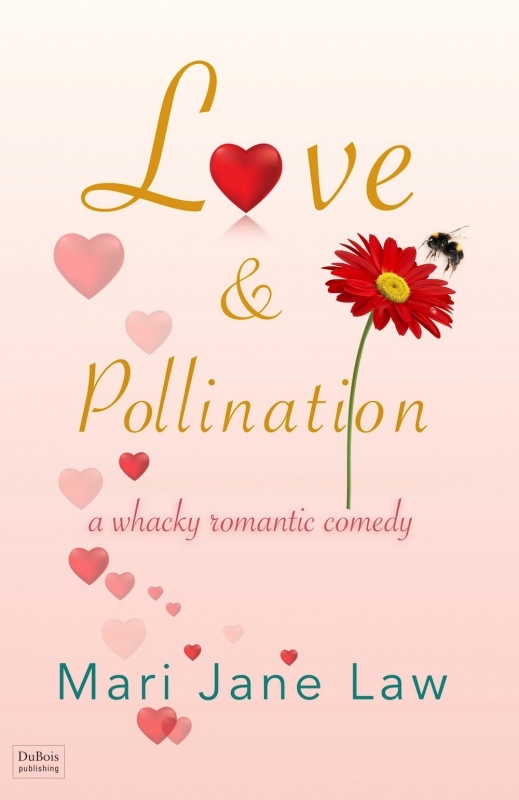 Hi Mari Jane, thank you for joining me today. Can you tell me about your novel, Love and Pollination and what inspired the story?
Hi Mari Jane, thank you for joining me today. Can you tell me about your novel, Love and Pollination and what inspired the story?
Hi Laura, thank you for inviting me to Novel Kicks and giving me this opportunity to talk about my book.
Love & Pollination is about an extremely naïve young woman called Perdita whose Catholic education and convent upbringing did not prepare her for having an intimate relationship. Being so innocent, she makes mistakes – and she ends up pregnant. Then she loses her job – and her home. But she’s optimistic and makes the best of things despite the intrusion of Saul Hadley into her life. She thinks that she can get the better of him – and readers will have to see if she succeeds!
The story was inspired by the fact that faith schools in the UK are not required to have Sex and Relationship Education (the government has now changed it to Relationship and Sex Education as they probably realised the revised word order was more appropriate for young people). So students in religious schools can end up being pretty ignorant about the birds and the bees – and how to spot a no-good womaniser.
I thought it would be fun to have a character who was brought up by nuns in an orphanage attached to a convent – and who had a Catholic convent education – to explain her innocence. And the plot set-up relies on her naïveté as do many of the jokes. That aside, she is still a unique character as you will see if you read the book – she has an interesting approach to problem-solving.
How long did it take you to write Love and Pollination and what’s your process like from idea to final draft?
I began the idea of the book about thirty years ago – I tried for Mills & Boon and had no luck. I worked on other things and, on and off, came back to this novel. But it wasn’t until about eight years ago that I decided to completely re-write it and change the tone of my writing. Then something seemed to click – and I started to make people laugh at the writers’ group I’d recently joined. I decided the plot worked far better as a comedy.
I bought some books on writing comedy, and I watch a lot of comedy on TV. But I didn’t labour on the book continuously over the eight years – I had other comedy romance ideas and began work on those. It took a great deal of slog to get Love & Pollination to the stage where it was finally published and I’m incredibly grateful to DuBois Publishing for giving me the opportunity to present my book to the world. I am hoping that I will be quicker getting my next book out. I just have to find a publisher…
You were a member of the Romantic Novelists’ New Writers’ Scheme. How did that help you write your novel? Is this something you’d recommend to new writers?
I belong to a writers’ group – we read out a piece of our work for ten minutes and get feedback for another ten minutes or so. This is very valuable but people giving feedback in a writers’ group can only see snippets of the novel at a time. The great thing about the New Writers’ Scheme is that the entire novel gets read by one person and they give a comprehensive critique. This gives feedback on plot and character development and can identify problems that a writers’ group can’t.
I recommend the NWS unreservedly. I think it’s fantastic. The membership fee is small compared to what it would cost to have someone from, for example, a critique company read the book – it makes getting personalised help much more affordable.
What’s your typical writing day like?
I don’t have a typical day – my writing is erratic. Sometimes I go through a fertile period and make a great deal of progress and then I can go for weeks with not being able to work on my manuscript at all for one reason or another.
What elements do you feel make a good story?
NK Chats To… M W Arnold
 Hello Mick. I am so very pleased and proud to be welcoming you to Novel Kicks. What’s the experience been like so far compared to your first novel, ‘The Season for Love’?
Hello Mick. I am so very pleased and proud to be welcoming you to Novel Kicks. What’s the experience been like so far compared to your first novel, ‘The Season for Love’?
Hi Laura, it’s wonderful to be back celebrating my second novel, I’m delighted to be here. It’s never easy to obtain a contract for a book, and for some reason, in my opinion, if it’s not already in place, obtaining that second one is always the most nerve-shredding. When the email offer came through for this one, it was like a weight lifting from my mind.
Can you tell me a little about your first historical saga, ‘A Wing and a Prayer’ and what inspired the story?
Because of ill health, I hadn’t been writing, I’d wanted to but it hadn’t been working. My author friends had all been encouraging me to try, so when a friend suggested I try something new rather than to pick up an unfinished project, it was like a serendipitous moment. I was watching a program on tv called, Spitfire Women, about the lady pilots of the Air Transport Auxiliary in WW2. Before I was even aware I was doing it, I found myself scrolling around the internet and the beginning of a story idea reared its head. For this prod up the proverbial, I have two excellent authors and good friends to thank; best-selling romance author Sue Moorcroft and historical saga author par excellence, Elaine Everest. Also, after finding out so much about the brave women and men of the ATA, I wanted to write a kind of tribute to them. I hope I’ve done so.
What are the challenges of setting your novel in WWII?
Getting your facts right. Well, that’s only partially true, as in this day and age of the internet, you really shouldn’t be getting anything wrong, though it does happen. The other part, at least so far as I’m concerned, is making sure your characters behave and talk as they did back then. Compared to my romance, which was set in contemporary times, this was initially much harder to write until I got into the swing of it and now, it’s quite natural. Now I’m well into writing the third book in the series, writing as if my mind is back in the 1940’s seems natural. My main issue is, and will probably remain, writing in US English, as my publisher is based in the USA and prefers this. It still looks strange to me.
 What’s your writing process like from first idea to final draft? Are there any challenges when writing a book series?
What’s your writing process like from first idea to final draft? Are there any challenges when writing a book series?
A lot of my ideas, when I first tried my hand at writing, came from listening to Radio. I’d hear a song and that would spark an idea. I still have a folder with about 20 idea for stories, some are brief outlines, a few lines, some are up to 6 or 7 pages, quite full of detail, a few even with a start, a middle and an end. I’d like think I can get back to some of those at some point. For this saga series, once the idea came, I was able to start writing pretty fast. I like to begin a story as soon as the idea hits me and as I’m more of a panster than a planster, I can get the first draft down pretty quickly, even taking into account that my first drafts are more akin to between a second and third draft, as I edit as I go along; each chapter has to read right before I can move on to the next one. I also keep each chapter as its own file, as I find it much easier to go to what I need to if, well, I need to.
So far as writing a series is concerned, this is my first series as ‘The Season for Love’ was a standalone romance, I’m kind of learning my own way as I go along. I’m sure everyone who writes a series has their own ways, so there may be an easier way than the one I’m using, but so far, it works for me. I like to, if it’s possible, to leave each chapter on a cliffhanger. That’s not possible with a series of books, so far as the end of the book is concerned. I’d like to, but each book has to be able to be read as a standalone too, so that’s out of the question. What I have to do is give the reader an enjoyable reading experience, whilst making them want to find out what the characters get up to next. It’s a nice feeling to know that I’ll be coming back to these characters again too.
You are a member of the Romantic Novelists’ Association Do you feel that the RNA New Writers’ Scheme is worth joining if you’re wanting to start writing a novel?
My route to publication was through this esteemed scheme so, yes, very much so. I know so many authors who became published by joining the NWS scheme of the Romantic Novelists Association. It’s one of the hardest things to accomplish, having a book published and the support which this scheme provides is invaluable. I would recommend it to anyone who wishes to become an author.
What’s your favourite word and why?
NK Chats To… Emily Carpenter
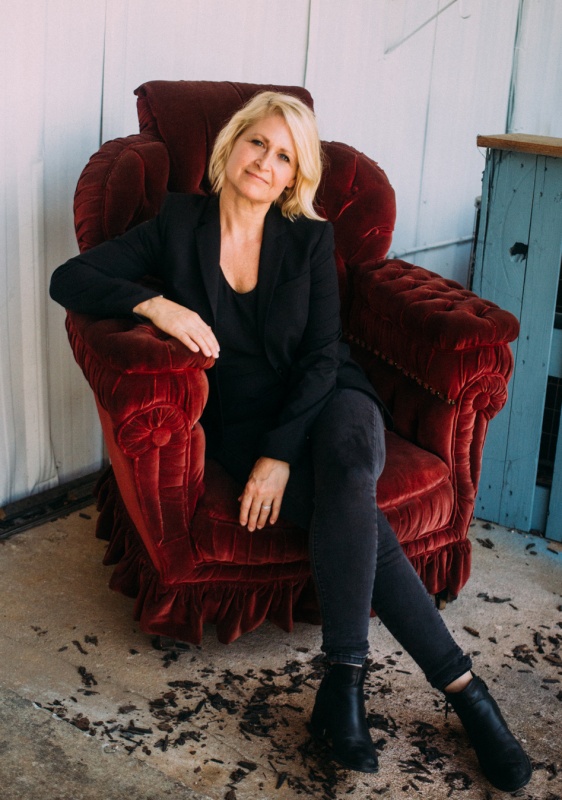 Hi Emily, thank you so much for joining me today. What’s your typical writing day like and do you have any pre-writing rituals, for example, needing coffee? Silence?
Hi Emily, thank you so much for joining me today. What’s your typical writing day like and do you have any pre-writing rituals, for example, needing coffee? Silence?
Thanks for having me! It’s funny, I don’t seem to have a typical writing day, which is something I actually enjoy. I will say, I’m not an early morning writer. Not a morning person in the least. I like to wake up, drink coffee and eat, get my son off to school and then exercise. Then I’m ready to sit down at the computer. I don’t really have rituals, but I do like to have the TV running in the background – a show or movie that I’ve seen before or don’t have to pay attention to. For some reason my brain likes multi-tasking in that way. Recently, I’ve been re-watching Peaky Blinders and it’s nice to, every once in a while, look up and go, “Oh, hello, Cillian Murphy, how’s the crime going?” I do firmly believe in hitting a minimum word count every day while I’m drafting a new novel. But if I don’t get my words, or I go weeks without writing, it’s fine. I kind of trust my creativity to lead the way and ask for what it needs.
Can you tell me about your novel, Reviving the Hawthorn Sisters and what inspired the story?
I had just finished my fourth book UNTIL THE DAY I DIE, which was an adventure-thriller, and I was feeling the need to get back to my Southern gothic, family focused work. I decided to write a sequel or follow up to my first book “Burying the Honeysuckle Girls” because there was still so much I wanted to explore with those characters. I toyed with some ideas, but it was when an author friend of mine said to me that this story was really about Dove Jarrod from “Honeysuckle Girls”, that it all came together.
The story is about Eve Candler (Dove’s granddaughter) who is in charge of administering her grandmother’s family foundation when she discovers that Dove may have been a con woman, thief and possibly a murderer. She has three days in Alabama to clear her grandmother’s name and protect her family’s legacy.
What elements do you feel make a good story?
Something unusual, that I haven’t seen before. I want a main character who’s dealt with very specific troubles from her past and who’s up against a really unique and specific problem in the present. You need the suspense and ticking clock and a vivid setting, yes, but unless your character and their problem isn’t specific, I find myself bored. I think it’s so fascinating how, the more unique those elements are, the more universal the story ends up being.
What were the biggest challenges you faced whilst writing Reviving the Hawthorn Sisters?
It was challenging to make the character of Eve, who’s living a quite unusual life, feel realistic and relatable. Eve’s a young woman but her job is maintaining her grandmother’s legacy as a beloved, famous tent evangelist / tent healer / miracle worker from the 1930s and 40s. Eve isn’t personally religious, doesn’t even believe that her grandmother actually ever worked a miracle, but she’s surrounded with people, like her mother, and all these donors who are true believers—and also it’s her job to raise money for the foundation. She doesn’t want to be disrespectful, but she’s dying to escape. She wants to fly – go to graduate school, have a romance, be a normal twenty-something. But she’s got to be this cheerleader for the memory of an old-time religious preacher.
Which authors do you admire and why?
Oh. So many writers today are just brilliant and creative and then, on the business side, just impress me daily with their marketing savvy. I think Ruth Ware tells epic stories. Riley Sager has his finger on the pulse of what people want to read. Shannon Kirk writes these vivid, incredibly poetic horror books that have created a fictional network of uber-rich American families whose descendants get away with murder.
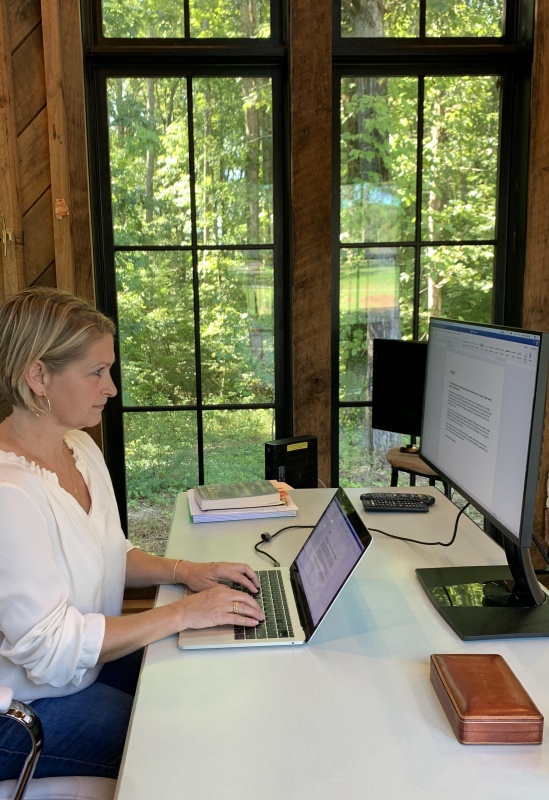 How do you approach the writing process, from idea to final draft and how long does it typically take you to write and edit a book?
How do you approach the writing process, from idea to final draft and how long does it typically take you to write and edit a book?
Different books have different journeys. Some books take a lot of thought before I write. Some I’ll start writing the minute I have the idea. I am a bit superstitious about not talking about a book until it’s written. It’s taken me anywhere from a year to six months to one month to write different books.
Which fictional world would you like to visit and why?
Well, I say I’d like to visit 18th century Scotland like in Outlander but only if Jamie is there and also, honestly, I’d probably end up complaining about the lack of hot running water and electricity and constant danger.
What’s your favourite word and why?
Book News: RNA Joan Hessayon Award 2020
 The winner of the Romantic Novelists’ Associations’ Joan Hessayon Award is due to be announced tomorrow (5th September 2020) via an online presentation.
The winner of the Romantic Novelists’ Associations’ Joan Hessayon Award is due to be announced tomorrow (5th September 2020) via an online presentation.
The contenders for this award are published authors who have passed through the RNA’s New Writers’ Scheme (as a member of this scheme myself, I can’t recommend it enough.) If you’d like more information on the scheme, click here.
There is a wonderful selection in this year’s shortlist from romantic comedies, to fairytale romance, to both historical and paranormal romance.
The Joan Hessayon Award is generously sponsored by gardening expert Dr. David Hessayon OBE, in honour of his late wife, Joan, who was a longstanding member of the RNA and a great supporter of its New Writers’ Scheme.
The winner will be announced at 3pm on Saturday 5th September (for more details, click here or here.) I wanted to say good luck to everyone.
The writers shortlisted for the 2020 award have shared a little about their novels and what it means to them to be nominated. Some of them have also shared some writing tips with us.
Impervious by Zoe Allison
Vampires exist in secret. The malevolent of their kind exploit their powers to terrible ends and a league of benevolent vampires works covertly against them. Amber Ridley is unique as the only human on that team. She’s an ‘Impervious’, and immune to vampire attack. However, is Amber impervious to love?
Zoe said, “I am delighted to be in the running for this award alongside other fantastic authors. I’m also extremely grateful for the Romantic Novelists’ Association’s amazing New Writers’ Scheme which gives us all such an amazing opportunity.
My bottom line in writing advice is don’t be afraid to do things your way. Whether you’re a plotter, a pantster, or a plantster there’s no right or wrong way and we’re all different. When it comes to editing the best tip I’ve had is to read your work out loud. You’ll catch loads of errors with missing or additional words and issues with flow that you’d otherwise miss because your brain automatically fills them in when you read in your head.”
Zoe Allison is a medic who writes romance in her spare time as a means to create the happy endings that real life often doesn’t provide.
Follow Zoe on Twitter. Click to view Impervious on Amazon UK.
Her Mother’s Secret by Jan Baynham.
Alexandra inherits Elin’s diary after her death, and is shocked to discover a part of her mother’s life she knew nothing about. Why had Elin kept her summer in Greece a secret? Compelled to visit the same island, will Alexandra uncover what really happened in that summer of ’69?
She said, “When I started writing short stories, I never thought I’d be able to write a novel. After I’d accomplished that, I never in a million years thought I’d be published, so to be a contender for the Joan Hessayon Award 2020 is beyond my wildest dreams. Without the RNA and so much support from other authors, I would not be here.
Always look for the positive and NEVER give up. Whenever I get a written critique, I highlight the positive comments first. Next, I do the same for the shortcomings, using a contrasting colour. If I agree, I then make a list of those, ticking them off as I edit to improve my manuscript. Seeing a critique visually and progressing through a list of things to work on is a great motivator for me.
Thank you. Good luck to my fellow contenders, too.”
Jan Baynham loves family secrets and finding skeletons that lurk in cupboards. When she decided that her main character was an artist with a well-hidden secret, she knew exactly where she wanted to set her story. As a Grecophile, she felt that the colours of the sea and flowers, together with the warmth of the people, would be perfect for an artist’s travels and it would involve more Greek holidays for Jan for the purposes of research!
Follow Jan on Twitter. Click to view Her Mother’s Secret on Amazon UK.
The Beginner’s Guide to Loneliness by Laura Bambrey.
Tori is offered a reviewer’s spot on a wellbeing retreat, and is worried that she’ll have to share too much of herself. But as The Farm weaves its magic, she soon realises that opening up isn’t the worst thing in the world. And sharing a yurt with Bay definitely isn’t!
Laura Bambrey said, “Being shortlisted for the Joan Hessayon award, along with so many other fabulous debuts, is such an honour. I can’t thank the RNA enough for their support.
My top piece of writing advice is to read your manuscript out loud to yourself. Don’t plug it into a piece of technology to do it for you – read it in your own voice. Doing this helps you check the ebb and flow of your writing – the pacing and the sentence structure. If anything trips you up, change it so that it flows better. This is particularly helpful with dialogue – and stops any of your characters from hogging the limelight with a monologue!”
Laura Bambrey has been a book blogger for nearly ten years, writing about and reviewing books from a range of genres, but mainly commercial women’s fiction. She’s also held down a range of weird and wonderful jobs, including trapeze choreographer, sculpture conservator and stilt walker. She has always dreamt of writing her own books.
Whilst writing, Laura did a lot of research into loneliness, anxiety and phobias – little thinking that lockdown and Covid would come along to make these issues far more prevalent. She found the Mind.Org website to be an incredible source of information and support for those who might be seeking it.
She is keen to mix the grittier bits that life throws at you with the romance and humour that make life worth living … but she’ll always make sure her heroine gets her happy ever after in the end.
Follow Laura on Twitter. Click to view The Beginner’s Guide to Loneliness on Amazon UK.
Finding Prince Charming by Victoria Garland.
NK Chats To… Nia Lucas
![]() Hi Nia, thank you so much for joining me for a chat today. It’s great to welcome you back to Novel Kicks with the blog tour for your new novel. Can you tell me a little about Choices, Shape, Losses Break and what inspired the book?
Hi Nia, thank you so much for joining me for a chat today. It’s great to welcome you back to Novel Kicks with the blog tour for your new novel. Can you tell me a little about Choices, Shape, Losses Break and what inspired the book?
‘Choices Shape, Losses Break’ is a real shift in tone from my first novel ‘Love Punked’. I’ve described it as My So Called Life meets Top Boy meets Skins! It’s a Contemporary Fiction/Contemporary romance hybrid and it’s interwoven with some challenging themes and issues which aim to get the reader continually re-evaluating their assumptions about risk and threat.
It’s set firmly in the 90’s where, shunned and struggling at home and school, teenager Lorna Davies clatters into chaotic and charismatic Shay O’Driscoll and Leon Barrett at an illegal rave. As Lorna’s talent for dancing sees her unexpectedly employed in the strobe-lit heart of 90’s club culture, her world is turned on its head by her budding friendship with Shay and Leon. For the boys, their high-risk lives endanger all three of them in an association that blurs the lines between friendship and dependency.
As the risks escalate, Lorna’s best friend Hannah, her brother Dan, her bully-turned-protector Nico and her unexpected friend Rosa watch with concern as she is thrust ever closer to harm in an intoxicating new landscape. When life-threatening events threaten to separate them permanently, Lorna, Leon and Shay juggle love, loyalty, sacrifice and exploitation as their lives change beyond recognition. Will the losses they face break them all?
‘Choices’ was inspired by some of my own experiences of rave culture in the 90’s and the people and places that I knew back then. I actually sat down to write it back in 2016 when I realised that two people who were really important to me back in those days, would have turned 40 that year. Their impact on my life has been pretty significant but we lost touch. I guess in some ways, ‘Choices’ started off as a bit of a tribute to them but in typical ‘pantser’ style, it turned into something very much unexpected. ‘Choices;’ is written to be a standalone novel but there are 3 further books in the series. The next one is due for release later this year.
Which songs would feature on a playlist for this novel?
Music is a massive part of ‘Choices Shape, Losses Break’. 90’s club culture was- and remains- an important part of my life. My friendships and experiences of that world were huge inspirations for the characters and events in the novel. This playlist could go on indefinitely and so I’ll pick my top 10:
Paul Van Dyk- For an Angel
Prodigy- No Good, Start the dance
DJ Taucher- Ayla
Dodgy- If you’re thinking of me
DJ Flavours- Your Caress
Dub Pistols- Cyclone
Faithless- Salva Mea
Marc and Claude- I need your loving
BT- Remember
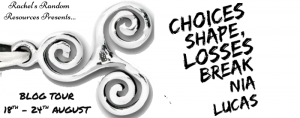 What’s your writing process like and how has it changed from when you first started writing?
What’s your writing process like and how has it changed from when you first started writing?
I work full time in an incredibly busy inner-London social work team. Writing is truly my escape from the madness and demands of my work life! I have terrible insomnia and only need 4/5 hours sleep a night so my writing process is that I write while everyone else sleeps- I love the coziness of sitting in the gloom tapping away and creating characters and places.
I’m absolutely a pantser, I never plan anything when it comes to my novels. I’ve written 4 books and both ‘Love Punked’ and ‘Choices Shape, Losses Break’ are available right now on Kindle and Kindle Unlimited, rated 5 stars, I have another two finished novels that are due for release later this year. I’m finishing one that’s nearly complete and I’m working on 3 other ‘new’ ones that are only 20 or so pages long each so far. I do like flitting between them all and I genuinely work out the plot as I go.
I guess one thing that’s changed is that I am far more conscious of streamlining my writing as I go- I had a real journey to edit down ‘Choices Shape, Losses Break’ and I’ve learnt lots of lessons from that heartbreaking process! I definitely challenge myself as I go now (“Does this actually progress the plot?” “Is this scene truly necessary?” “Is this character essential?”) . I’m definitely more succinct in my style!
What’s a typical writing day like for you? Do you prefer silence? Coffee?
Novel Kicks Fiction Friday: Familiar Days
 It’s Friday which means it’s time to start writing some fiction.
It’s Friday which means it’s time to start writing some fiction.
Fiction Friday is our weekly writing prompt.
The aim is to write for a minimum of five minutes and then keep going for as long as you can.
Once you’ve finished, don’t edit, just post in the comments box below.
Today’s prompt: Familiar Days.
You have a bad day. Everything that can go wrong does go wrong.
You are pleased when it’s time for bed.
When you wake up, you find yourself reliving your bad day. And it happens again and again and again.
Novel Kicks Fiction Friday: I Remember
 It’s Friday which means it’s time to start writing some fiction.
It’s Friday which means it’s time to start writing some fiction.
Fiction Friday is our weekly writing prompt.
The aim is to write for a minimum of five minutes and then keep going for as long as you can.
Once you’ve finished, don’t edit, just post in the comments box below.
Today’s prompt: I Remember….
You wake up one morning and discover a world without books.
You ask people about them and no one knows what you’re talking about. In fact, you’re the only one that remembers them. You are the only one that owns books.
Write about what happens when your small selection of books is discovered. Are you seen positively or otherwise?
Novel Kicks Writing Room: The Middle of the Action
 Welcome back to the Novel Kicks Writing Room.
Welcome back to the Novel Kicks Writing Room.
Today, I wanted to do some free-writing but focused around beginning the story in the middle of the action.
Using dialogue as your starting line, write up to 500 words of an action scene that puts the reader in the middle of the action. Continue to use dialogue as much as you can.
For example, ‘You need to jump. Now.’
Who your character is in terms of age and background is up to you.
You are welcome to use my example if you like.
Let me know in the comments if you try this and how you found it. What was easy or difficult about it?
Novel Kicks Fiction Friday: Freaky Friday
 It’s Friday which means it’s time to start writing some fiction.
It’s Friday which means it’s time to start writing some fiction.
Fiction Friday is our weekly writing prompt.
The aim is to write for a minimum of five minutes and then keep going for as long as you can.
Once you’ve finished, don’t edit, just post in the comments box below.
Today’s Prompt: Freaky Friday
You have a chance encounter with the person you envied in school. You have always wanted to know what it was like to be them.
When you wake up the following day, you discover you and this person have swapped bodies. They are now you, you are now them.
Write about your day and how you attempt to make things right? Are things as great as you imagined?
Novel Kicks Writing Room: Freewriting Objects
For the writing room today, I thought we could do some free writing.
First, write down the first four objects that come to your mind.
You are looking under your bed for something.
At the very back, behind some bags, is a shoebox. It is dusty. It’s not been touched for a while. It’s a box you’ve never seen before and you didn’t put it there.
You open it and discover….
Set a timer – ten minutes per object. Write about finding each one.
Novel Kicks Fiction Friday: Trapped in a Lift
 It’s Friday which means it’s time to start writing some fiction.
It’s Friday which means it’s time to start writing some fiction.
Fiction Friday is our weekly writing prompt.
The aim is to write for a minimum of five minutes and then keep going for as long as you can.
Once you’ve finished, don’t edit, just post in the comments box below.
Today’s prompt: Trapped in a lift.
Three people find themselves trapped in a lift.
These people have not seen each other for a few years.
They are all enemies.
NK Chats To… Murray Bailey
 Hello Murray, thank you so much for joining me today. What was the inspiration for Singapore Killer?
Hello Murray, thank you so much for joining me today. What was the inspiration for Singapore Killer?
The whole series was inspired by my father who was a military policeman in Singapore during the 1950s.
What prompted you to start writing the Singapore Series?
I read a Lee Child novel and thought: I can do that. I have a character and an exotic setting – plus the seeds for a plot. However I subsequently found it harder than I expected.
How much research did you do before starting?
I took my dad to Singapore for his 75th birthday. He thought it was a holiday but I never stopped asking questions. I’ve been again since. I’ve and also been to Kuala Lumpur and Penang, both of which feature in the series.
So no further research as you work?
Lots of research! I have a number of good reference books for the period including a fabulous one full of photographs. Of course I use the internet, but I also have a few readers who can also be called upon to help.
Singapore Killer is book 5. Can it be read as a stand-alone?
I hope so. It’ll help to read them in order, but it really shouldn’t matter.
Will there be a sixth book?
Yes, it’s called Singapore Fire, and it will be the last of the series. However Ash Carter may well appear in Hong Kong if he does resurface.
Map of the Dead which had flashbacks to ancient Egypt, was an Amazon best seller. Your dad didn’t inspire that one?
NK Chats To… Derwin Hope
 Thank you so much for joining me today, Derwin. Can you tell me a little about your book, Charles Dickens: My Life?
Thank you so much for joining me today, Derwin. Can you tell me a little about your book, Charles Dickens: My Life?
It is the life story of Charles Dickens using his own words to tell his story. On a number of occasions Dickens expressed the wish to write his own life story, but he died prematurely in 1870 at the age of 58 without doing it.
Now 150 years later and for the first time I have collected up all the various pieces of that jigsaw of things that he said about his life and put them into the narrative. It produces the nearest thing to an autobiography that is now possible.
Details of me, what I have done, and the written comments of people who have read my proofs can be seen on my official website at www.dickensmylife.com.
What challenges did you face when writing this novel?
The overwhelming challenge of hunting out things he actually said and did, as distinct from what other people have said about him in the last 150 years.
 How did you approach the writing process for this novel?
How did you approach the writing process for this novel?
I began my research about 25 years ago, became more focussed about collecting up the relevant pieces after I became a Judge in Portsmouth (his birthplace) in 2004 and visited the bedroom of his birth, and once I had retired in 2014 spent nearly 4 years putting all the pieces I had found together into a continuous narrative.
What do you think Charles Dickens would feel about the current state of the world?
I suspect he would be highly critical about it, as he was in his own day. He never trusted most politicians, having seen them at work in Parliament in his early career as a Parliamentary reporter. He later referred to Parliament as “The Dustheap of Westminster”. He was equally damming on the politicians he saw in America, as well as the way the press reported things over there.
He said many of the newspapers were only fit to be used as a water closet doormat. He was a Radical by nature and had a huge social conscience and whenever he saw anything that he felt was socially wrong he spoke out strongly against it. He became the people’s champion and that is why he was so loved in his time, apart from the brilliant fictional novels he also wrote. I think he would have taken the same approach to the social issues of today if he was alive now.
Which Charles Dickens character would you like to meet and why?
Novel Kicks Fiction Friday: Stranded
 It’s Friday which means it’s time to start writing some fiction.
It’s Friday which means it’s time to start writing some fiction.
Fiction Friday is our weekly writing prompt.
The aim is to write for a minimum of five minutes and then keep going for as long as you can.
Once you’ve finished, don’t edit, just post in the comments box below.
Today’s prompt: Stranded.
You wake up to find that you’re on a deserted Island. You don’t remember how you got there. The last you remember, you were at home.
There doesn’t seem to be anyone around until you are approached by an animal. Yes, this animal seems to be able to walk like a human can.
What shocks you even more is when this animal smiles at you, welcomes you to the island and hands you a tent.
Continue the story…
Novel Kicks Writing Room: Planning Short Stories
 Today, I want to go back to the beginning and look at planning.
Today, I want to go back to the beginning and look at planning.
I am quickly becoming aware that I am not a writer who can just sit down and write. I need to know where I want my story to go or I end up with a lot of similar scenes as my story goes around in circles as I have no idea how to move it forward.
So, today’s exercise is the following…
Make a plan for a story, in note form that’s related to one of the following topics..
Inheriting an old house.
A blind date
Broken down car in a deserted area
A holiday that goes wrong
My Writing Ramblings: Finding my Motivation
 May is finally on the horizon.
May is finally on the horizon.
April has seemed such a long month.
There is certainly a strange atmosphere right now as we all try and navigate our way through this situation. To me, it feels like that week between Christmas and New Year where you’re waiting for something to happen but not quite sure what to do with yourself.
I am naturally the type of person who likes being at home, preferably with warm pyjamas, a duvet, a cup of tea, a snoozing cat and a book although I am slightly obsessed with Animal Crossing right now. Despite being this type of person, even I am beginning to struggle with the lockdown. It’s necessary to stay at home but we’re only human. It’s natural to find it hard, even when you know it’s the right thing to do.
At the beginning of April, I was struggling with motivation to do anything (my enthusiasm to do housework is never there.)
It’s amazing how tiring doing nothing makes you, right?
I have been reading a lot which I love. I am also finally writing and I am so proud of this fact.
If you’re struggling to be motivated, I wanted to share something that has really helped me in the last few weeks.
Since discovering a website called Unchained Writer, I have managed to write every day since 9th April. My aim is 1,000 words each day and for the most part, I have managed this with a couple of exceptions. Regardless, it all helps to get me closer to writing and finishing a novel I have been trying to find the confidence to write for years.
Unchained Writer has been a real game changer for me. It’s made such a difference.
Novel Kicks Writing Room: Childhood Differences
 Today, I want to again focus on how the same scene can be seen differently by two people despite being in the same room, witnessing the same thing.
Today, I want to again focus on how the same scene can be seen differently by two people despite being in the same room, witnessing the same thing.
I have been thinking about this a lot lately. When writing from the point of view of my main character, I also wonder what the other people in the particular scene are thinking.
In my own childhood, if asked, I would probably remember an event differently than my siblings would. I used to dance and enter competitions. How was it for my brother who was dragged along?
Think of an incident from your childhood where you were the centre of attention. How did you feel? What happened? Write for ten minutes, basing your story about this incident.
Now, write for another ten minutes but this time, write from the point of view of a sibling, cousin or friend who was also there. What differences are there in the thoughts, feelings and view of events?
A Moment With… Nia Rose and Octavia J. Riley
Nia Rose and Octavia J. Riley are co-authors of Spellbound and Hellhounds and Secrets of the Sanctuary, the first two novels in the Coven Chronicles.
About Spellbound and Hellhounds, book one in the Coven Chronicles.
Enter the world of Raen, turn left at the land of dragons, and you’ll find yourself in the country of Aeristria. A place overflowing with magic and creatures that were once only heard of in fairy-tales. In the heart of Aeristria is the capital city, Tolvade. Here you will find shops and taverns, laughter and fun, runesmiths looking for their next job and sneaky pickpocketing imps. Steer clear of the galloping gang of centaurs and you will see the headquarters of the prestigious Coven.
Within the Coven’s lower ranks, you’ll find Vanessa, a third-year Hunter itching to become a Spellweaver. Her and her trusted demon partner, Botobolbilian, must investigate an explosion at the academy and bring the culprit responsible in. Easy job, right?
Wrong.
Vanessa and her partner find that this investigation runs deep in black magic and sprinkled with feral demon summonings. With countless lives on the line, Vanessa struggles with self-doubt and following her heart (and laws) as she tries to right the wrongs of these heinous criminals and bring them to justice before they do any more harm.
But, with an oncoming yearly blizzard just days away, is it too late? Even with all the magic, spells, and power on Raen, this job might be the last that this duo ever faces…
About Secrets of the Sanctuary, book two in the Coven Chronicles.
Thea Bauer has earned her way to being a highly skilled member of the Coven. Ranked as a Spellweaver, she’s assigned the more dangerous missions. Corralling a herd of wild unicorns? No problem. Taking down a witch riding the high of black magic? Piece of cake. Finding out why magic-based creatures are suddenly flooding the local sanctuary, protected by a powerful sorceress with a hatred for the Coven? Thea might need more than her tethered demonic partner to see this mission through.
She calls upon Summoner Rafe MacBain, a trusted colleague she’s known for years whose dreamy eyes might keep her up at night—but she’s not admitting that to anyone. He’s got his own demonic companion, and altogether they’re a force to be reckoned with. But, even with their combined strength, it might not be enough against feral demons escaping some of the farthest reaches of Hell.
As if that weren’t bad enough, Thea must conquer her own demons residing within herself that conjure up a painful past. Will she be able to overcome herself, or will the memories she’s tried to stray from keep her from fighting enemies in the physical realm? Thea is starting to wonder if the sorceress may be one of those enemies too. What secret is she hiding at the bottom of the sanctuary, and how will it affect everything Thea has come to know?
Octavia has joined me today to talk about duel writing and the challenges both she and Nia face. Thank you for joining me. Over to you.
 Nia and I get asked quite frequently how we go about writing a dual-trilogy of the same world in the same timeline. We always look at each other and agree: challenging. Not in the “Oh, this is so hard“ or “You can’t do that, it doesn’t work with MY story” sort of way (not to say we haven’t said that once or twice…). It’s challenging in a way that forces us to think, adapt, grow, and roll with what we’re given. It challenges us as authors and puts our imaginations to the test, which is invaluable when delving into fantasy.
Nia and I get asked quite frequently how we go about writing a dual-trilogy of the same world in the same timeline. We always look at each other and agree: challenging. Not in the “Oh, this is so hard“ or “You can’t do that, it doesn’t work with MY story” sort of way (not to say we haven’t said that once or twice…). It’s challenging in a way that forces us to think, adapt, grow, and roll with what we’re given. It challenges us as authors and puts our imaginations to the test, which is invaluable when delving into fantasy.
There’s definitely flaws and loopholes when writing in a world shared by another author, but the beauty of that is that there’s two set of eyes to catch these loopholes. I remember we were so engrossed in our stories that we kind of got carried away, and Nia came up to me and was like, “Uh…hold on, was I at the Grim Bean the same time you were talking to the imp?” We realized that our characters did, in deed, come into close contact with each other, and this gave birth to our first cameo appearance in Spellbound & Hellhounds. We were able to sneak one more cameo appearance in when both of our characters were in Tasgall’s at the same time (something that we both realized later when we read over the story, because we clearly didn’t learn about paying attention to the timeline the first time). We’re those authors who don’t know exactly where the story’s going when we write it. We just write it however it comes to us. Neil Gaiman once said “Write down everything that happens in the story, and then in your second draft make it look like you knew what you were doing all along.”
Novel Kicks Fiction Friday: Once Upon a Time in a Fictional World
 It’s Friday which means it’s time to start writing some fiction.
It’s Friday which means it’s time to start writing some fiction.
Fiction Friday is our weekly writing prompt.
The aim is to write for a minimum of five minutes and then keep going for as long as you can.
Once you’ve finished, don’t edit, just post in the comments box below.
Today’s prompt: Once Upon A Time in a Fictional World…
You’ve fallen asleep. When you wake up, you find yourself in a fictional world. This world is from whatever novel you’re currently reading.
Without directly referencing the novel, place yourself in one scene and rewrite it to include you as a character. How would you react to find yourself in a fictional world?
Are you reading a romance and have woken up to find that the main character doesn’t like you? If you’re rediscovering Harry Potter? How about waking up in the great hall at Hogwarts?
Have fun.
Novel Kicks Writing Room: Different Voices
 Today, I thought we could look at distinguishing one character from another.
Today, I thought we could look at distinguishing one character from another.
Making my characters sound different to one another is one of the things I am finding the hardest to do as a first time writer.
I came across this exercise via The Writers Digest and thought that it sounded quite interesting. (Visit their website if you’d like to explore more of their prompts and writing exercises.)
Write a couple of pages of conversation where one character talks in say, four word sentences and the other in ten word sentences.
For example, ‘I can’t do this.’
‘Yes, you can. You are being ridiculous. Just be brave.’
‘It’s just too hard.’
Novel Kicks Fiction Friday: Following the Leader
 It’s Friday which means it’s time to start writing some fiction.
It’s Friday which means it’s time to start writing some fiction.
Fiction Friday is our weekly writing prompt.
The aim is to write for a minimum of five minutes and then keep going for as long as you can.
Once you’ve finished, don’t edit, just post in the comments box below.
Today’s prompt: Following the Leader.
Your character wakes up and finds themselves in a strange village.
There are four other people with them and no one seems to have met one another before.
Someone appoints themselves the leader of the group whilst you all try to find a way out of this village.
On first inspection though, there doesn’t seem to be a way out.
Novel Kicks Writing Room: Word Association
 Happy Wednesday all. For today’s writing group, I thought we’d work from a prompt using word association.
Happy Wednesday all. For today’s writing group, I thought we’d work from a prompt using word association.
This is one of my favourites as you can never tell what it will inspire.
Pick up the book that’s closest to hand. Go to page one hundred.
Make a note of the first and last words on the page.
Now, on a sheet of paper, put each word at the top and divide the page into two columns.
Use the timer for five minutes each side and using each word as a beginning, write down as many words as you can think of.
Once you’ve done that, write a story by using the first two words you took from the book to start with and then incorporating all the other words as you go.
Novel Kicks Writing Room – Dear Me
 I often wonder what my future and past self would tell me if I were to receive a letter from them.
I often wonder what my future and past self would tell me if I were to receive a letter from them.
What advice would I give myself? What would my ten-year old self talk about that is different to my older self?
I find this thought fascinating.
That is why I have chosen this exercise today. Write a letter to you, from yourself ten years in the future. Also write a letter from the point of view of your ten-year old self.
Obviously the advice and content would be slightly different but are there recurring themes?
Set the timer for about ten minutes for each one. Try not to edit, just write.
Now repeat the exercise but for one of your characters.
Novel Kicks Fiction Friday: Talk to Animals?
 It’s Friday which means it’s time to start writing some fiction.
It’s Friday which means it’s time to start writing some fiction.
Fiction Friday is our weekly writing prompt.
The aim is to write for a minimum of five minutes and then keep going for as long as you can.
Once you’ve finished, don’t edit, just post in the comments box below.
Today’s prompt: What if I could talk to the animals?
You have been stuck inside for a few days now. You are on your own with only your pet for company.
One morning, a voice you don’t recognise brings you out of sleep.
Your pet is on the bed with you but there is no one else there.
That is until you hear the voice again.
You turn toward your pet…
Continue the story.
Novel Kicks Writing Room: The Same But Different
 Today, I thought we could look at different points of view.
Today, I thought we could look at different points of view.
You have three characters standing together in the same spot.
They are all looking at the same thing. It could be the sky, a building, a pier, another group of people. The situation and gender of your characters are up to you.
Set the timer for ten minutes each character.
Write three different pieces of prose, describing what they are looking at but from each person’s point of view, voice and opinions.
How do they differ?
Novel Kicks Fiction Friday: What Curfew?
 It’s Friday which means it’s time to start writing some fiction.
It’s Friday which means it’s time to start writing some fiction.
Fiction Friday is our weekly writing prompt.
The aim is to write for a minimum of five minutes and then keep going for as long as you can.
Once you’ve finished, don’t edit, just post in the comments box below.
Today’s prompt: What curfew?
A curfew has been put in place all over the city where you live. There are patrols everywhere. There’s not a lot that will get by them.
You find yourself defying the curfew to deliver a message on the other side of the city. You must do this by morning.
Write about the journey. Do you and your message make its destination in time and in one piece?
Novel Kicks Writing Room: The Torn Piece
 Happy Wednesday everyone. Today, I wanted to do some more free writing.
Happy Wednesday everyone. Today, I wanted to do some more free writing.
The amount of time and word count is up to you.
Today, imagine that you’ve found a torn piece of paper.
It appears to be the end of a letter; a love letter from someone named Paul.
There’s no sign of the first piece.
It says “even though what we have is gone, I would not change the decision I made for you, regardless of the consequence for me. I will love you forever. Paul”
Write the first part. Try and put in as much detail as you can.
Novel Kicks Fiction Friday: Freaky Friday
 It’s Friday which means it’s time to start writing some fiction.
It’s Friday which means it’s time to start writing some fiction.
Fiction Friday is our weekly writing prompt.
The aim is to write for a minimum of five minutes and then keep going for as long as you can.
Once you’ve finished, don’t edit, just post in the comments box below.
Today’s prompt: Freaky Friday.
Your character and their spouse have not been getting along lately.
One morning, you wake up and you’ve swapped bodies. You also currently have no idea how to get switched back.
How does this affect the relationship?
Novel Kicks Writing Room: Inanimate Objects
 It’s all about inanimate objects today.
It’s all about inanimate objects today.
For today’s exercise, it’s a little bit of free writing but with the following situation in mind.
Write from the point of view of an inanimate object. Maybe something in an antique shop or something in the corner of the room you are sat in.
How old is it? Where has it been? What has this object seen?
Also, you could allow it to have an interaction with a human in which they can understand one another.
Write for at least fifteen minutes.
NK Chats To… Daisy Pearce
 Thank you so much for joining me today, Daisy. Tell me a little about your novel, The Silence and what interested you most about the premise?
Thank you so much for joining me today, Daisy. Tell me a little about your novel, The Silence and what interested you most about the premise?
Hi! Thanks for having me. A lot of my ideas begin with an image and in the case of The Silence it was the image of a woman jumping into the sea with her toes pointed downward. I’d been reading a lot about gaslighting – a covert form of emotional manipulation – and how easily it could be used to isolate someone from their friends and family.
The two ideas came together almost at the same time. Stella (the central character) is a former child star and I liked the idea of her trying to untangle herself from her former fame.
What were the challenges of writing this novel?
Ha. All of them. All the challenges! Time, for one. I squeezed writing The Silence into every moment my daughter was asleep and then again when I forced myself to wake up early. It’s the commitment, I think. Financial, emotional, mental.
Sometimes the story was so suffocating I would happily have drop kicked my computer into the sun. Other than that, you know, it was a breeze!
What’s your writing day like? Do you have any writing rituals?
A cup of tea. We live in a cold, cold house and so in the winter I started writing in bed with a hot water bottle so now that is where I write 99 percent of the time. I’m told it’s terrible for my sleep hygiene but I’m stuck in it now.
 I work in a library, so I write in between the end of my work day and school pick-up and then again in the evenings. There’s a lot of opportunity for procrastination so I try to be really disciplined.
I work in a library, so I write in between the end of my work day and school pick-up and then again in the evenings. There’s a lot of opportunity for procrastination so I try to be really disciplined.
Which fictional character would you like to meet and why?
This is a great question and I’ve got two terrible answers for it. One, is Nanny Ogg’s cat Greebo from the Discworld novels but only – only – when he turns into a piratical man. The other is all the kids from the Losers club from the novel IT, the people I most identified with as an adolescent.
NK: My husband is a huge fan of The Discworld and I also think he would like to meet Greebo.
In your opinion, what’s the most important thing to remember when developing characters?
Personally, I like to see flaws in a character. Jealousy, anger, bitterness. I need to see them as human and I need to care if they live or die. That’s what carries me through a book. I don’t neccessarily need to relate to them but I do need to know they’re not entirely whole. That helps, for me.
Which author has made the most impact on you as a writer?
Novel Kicks Fiction Friday: Wrong Number
 It’s Friday which means it’s time to start writing some fiction.
It’s Friday which means it’s time to start writing some fiction.
Fiction Friday is our weekly writing prompt.
The aim is to write for a minimum of five minutes and then keep going for as long as you can.
Once you’ve finished, don’t edit, just post in the comments box below.
Today’s Prompt: Wrong Number….
You are at home, it’s the weekend and after a long week, you want to rest.
Your phone pings, indicating a message.
Absent-mindedly, you look at the message and you have to read it a couple of times in order to take it in.
‘You’ve not answered my question. The clock is ticking.’
You stare at your phone, not sure what to do.
Another message arrives…
Novel Kicks Writing Room: Point of View
 Today’s exercise is changing POV for your character.
Today’s exercise is changing POV for your character.
I am quite excited about today’s exercise and I think it’s great to flip the WIP on its head.
Using your current work, pick a passage featuring your main character. If you’d rather pick a character from your favourite novel, please do.
Now, change the point of view. For example, if you’ve written in first person, re-write in third person and vice versa.
If you wanted, you could also re-write from a secondary character’s point of view.
How did you find it? Did it inspire you to add more to the story and to see another aspect?




